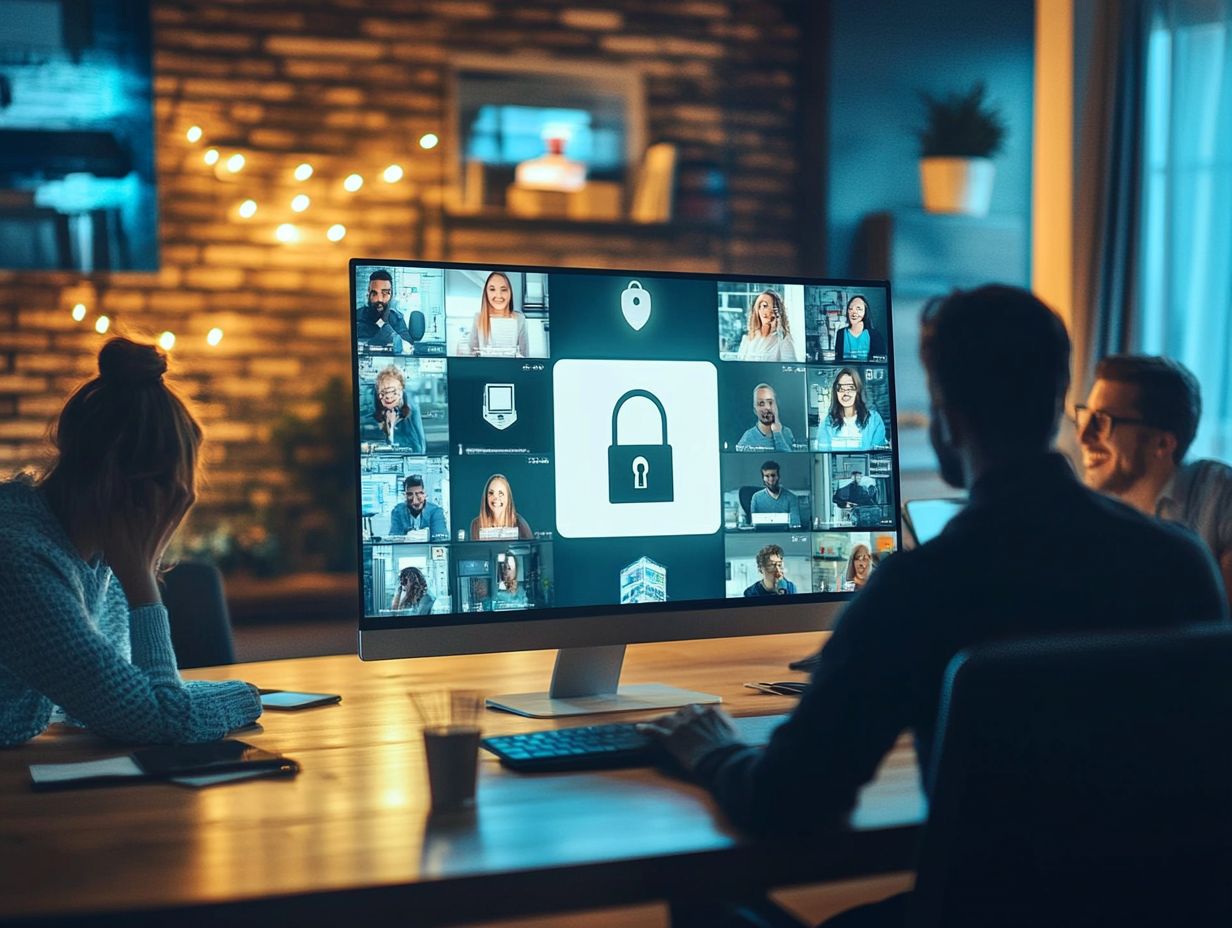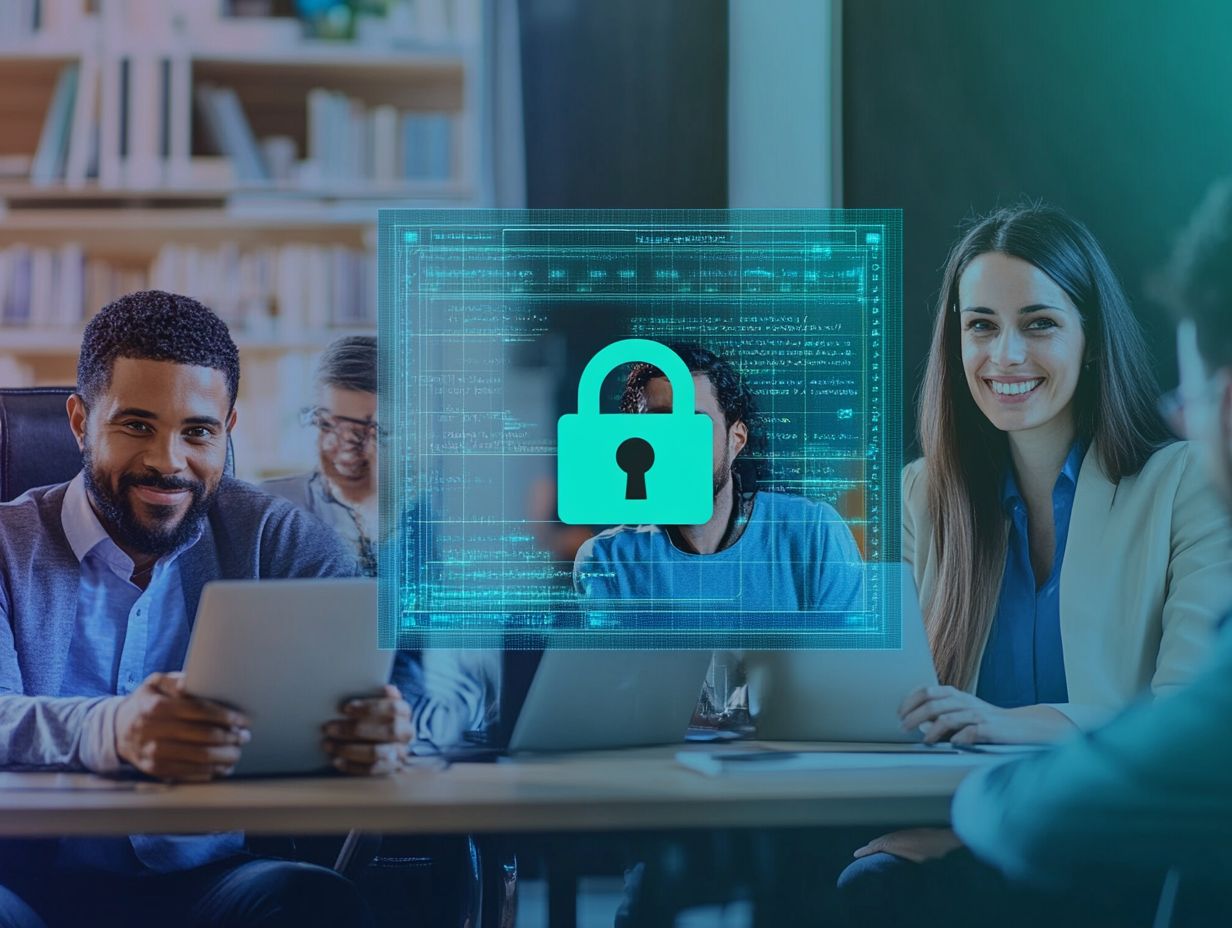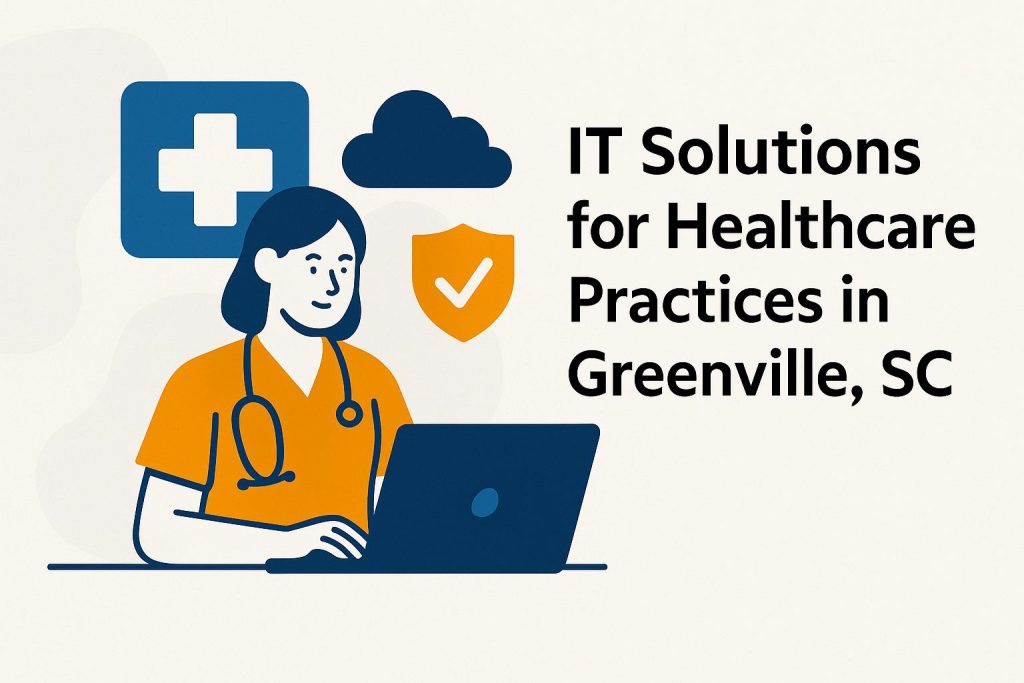Remote Work Security Solutions for Greenville Businesses

In today’s fast-paced digital landscape, remote work is now essential for businesses. It offers flexibility but also poses security challenges. It offers flexibility. However, it brings security challenges that companies must address. This article looks at common security threats. These include phishing attacks, malware, and unsecured networks that remote workers encounter.
It outlines effective security solutions for Greenville businesses. These include strong password policies, VPNs, two-factor authentication, and employee training. Organizations can equip themselves with the knowledge necessary to safeguard remote work environments, ensuring strong cybersecurity measures are in place.
What is Remote Work and Why is it Important?
Remote work, often referred to as telecommuting, has become increasingly essential for businesses, particularly in Greenville, as it fosters a more flexible work environment.
This approach enables employees to work from various locations, ensuring business continuity, data protection, and access to a broader talent pool while maintaining productivity levels.
As this work culture continues to rise, organizations must focus on cybersecurity. This protects sensitive data and enables secure collaboration among their remote workforce.
The implementation of effective cybersecurity policies is crucial for mitigating risks associated with remote operations, including data breaches and compliance issues, thereby making it a fundamental necessity in today’s digital landscape and ensuring secure access to data (our overview of IT challenges small businesses face offers insights into common obstacles and solutions).
Common Security Threats for Remote Work
Businesses with remote work face many security threats. These threats can harm operations and sensitive data. This underscores the need for threat detection solutions. The shift to a remote workforce frequently exposes organizations to vulnerabilities such as phishing attacks and malware, which can result in significant data breaches.
Additionally, the use of unsecured networks and devices by employees further amplifies these risks, underscoring the necessity for companies to establish comprehensive cybersecurity measures, including robust firewalls and data encryption techniques. Recognizing these threats is crucial for businesses in Greenville to implement effective security solutions and protect their digital assets. For an extensive analysis of these challenges, our deep dive into the top IT challenges faced by small businesses in Greenville provides valuable insights.
Phishing Attacks and Malware
Phishing attacks and malware are major threats to remote workers. They often target employees with deceptive emails and links. These attacks can compromise sensitive information, resulting in severe data breach incidents and substantial financial losses for organizations.
Companies must use effective malware protection and cybersecurity tools. Remote monitoring systems are also important. These measures help protect against threats and promote cybersecurity awareness among their remote workforce. By educating employees on phishing prevention, organizations can greatly diminish their vulnerability to such attacks.
Phishing tactics often involve spoofed emails that appear to originate from trusted sources, prompting recipients to click on malicious links or disclose confidential information, compromising endpoint security. Malware can manifest in various forms, including ransomware that encrypts files until a ransom is paid, or spyware designed to clandestinely collect sensitive data.
To mitigate these risks, businesses are advised to invest in robust security software and conduct regular cybersecurity awareness and employee training sessions for employees. These training initiatives enable staff to recognize warning signs in communications and adopt best practices for online safety, thereby enhancing the organization’s overall cybersecurity posture and resilience against evolving threats.
Unsecured Networks and Devices
Unsecured networks and devices create major security challenges for remote workers. They can allow cybercriminals to access sensitive information. When employees connect to public Wi-Fi or utilize personal devices for work purposes, they inadvertently expose sensitive corporate data to a range of threats, necessitating mobile device management solutions.
Organizations must use strong security protocols and mobile device management. This protects information and ensures secure remote access and IT infrastructure stability. Businesses in Greenville must adopt adaptive security measures to mitigate risks associated with unsecured networks, thereby enhancing their overall cybersecurity posture.
Organizations must create a multi-layered security strategy. This strategy includes IT support, business continuity, and endpoint protection.
- Encryption
- Strong password policies
- Regular security training for employees helps them recognize phishing and other malicious activities
Using Virtual Private Networks (VPNs) and Remote Access Solutions strengthens security. They encrypt data sent over insecure networks.
A comprehensive Mobile Device Management (MDM) approach helps businesses monitor devices accessing their network. This ensures personal devices meet security standards. Proactively managing these risks helps companies create a secure working environment. This also keeps teams productive and connected.
Digital Security Solutions for Greenville Businesses

Businesses in Greenville can improve their cybersecurity by adopting various security solutions. These should meet their specific needs, including threat intelligence and vulnerability assessment.
These solutions include the development of a comprehensive cybersecurity policy, the utilization of IT support, and the adherence to established security best practices. As mentioned in our overview of IT challenges faced by small businesses, identifying vulnerabilities and managing them are crucial steps that help organizations protect their data and assets.
This approach ensures that remote workers operate securely and efficiently, promoting business resilience and disaster recovery.
Implementing Strong Password Policies
Strong password policies are essential for securing remote work environments. By enforcing password management guidelines helps organizations reduce unauthorized access risks. This improves identity management and overall security configuration.
Teaching employees to create complex, unique passwords and follow security best practices helps raise cybersecurity awareness. This reduces vulnerabilities that cybercriminals may exploit.
A strong password policy should specify requirements for password complexity. It should require combinations of uppercase letters, lowercase letters, numbers, and special characters. Setting an expiration period for passwords ensures that compromised passwords do not remain valid forever.
Organizations should use password management tools to help employees generate and store complex passwords safely. Regular employee training is essential. It emphasizes following these policies and recognizing phishing attempts, enabling staff to protect sensitive information.
Using Virtual Private Networks (VPN)
Using Virtual Private Networks (VPNs) and Remote Work Tools is critical for businesses embracing remote work. It ensures secure connections between remote employees and corporate networks. VPNs encrypt internet data, protecting online privacy and sensitive information from threats, especially on unsecured networks.
Implementing remote access VPNs provides employees with a secure work environment and strengthens overall cybersecurity protocols.
These secure connections protect vital data and ensure compliance with data privacy regulations. Different types of VPNs, like site-to-site and remote access VPNs, provide tailored solutions for various business needs.
VPNs allow organizations to choose options that enhance security and optimize performance. This facilitates effective collaboration among teams from any location. As remote work grows, using a reliable VPN significantly reduces data breach risks, creating a safer work environment.
Utilizing Two-Factor Authentication
Two-Factor Authentication (2FA) helps protect against unauthorized access and identity theft in remote work. It adds an extra layer of security by requiring employees to verify their identity using a second method, like a text message or an app.
Integrating 2FA into cybersecurity frameworks helps organizations strengthen defenses against breaches and improve overall security.
There are several effective methods of 2FA that organizations can adopt, including:
- One-time passwords (OTPs) sent via SMS
- Push notifications from dedicated applications
- Biometric verification methods such as fingerprint scans
Each approach has benefits that meet different user preferences and technical skills. This promotes security awareness among employees. For example, using an authentication app can facilitate streamlined access while ensuring robust security.
This extra layer of verification protects sensitive data and improves information security. It also encourages a culture of security awareness among employees. As remote work continues to grow in prevalence, establishing these protocols for secure access to company resources is essential for IT security for defending against evolving cyber threats.
Regular Software Updates, Remote Monitoring, and Security Audits

Regular software updates are essential for strong cybersecurity and IT infrastructure in remote work. Keeping software current allows organizations to take advantage of the latest security patches and cybersecurity tools designed to address emerging threats.
By conducting security audits and implementing automated security solutions, Greenville businesses can streamline their update processes and strengthen their defenses against potential vulnerabilities.
The significance of these updates cannot be overstated, as neglecting updates can make systems vulnerable to cyberattacks, data breaches, and disruptions in business operations. In an era where cyber threats are becoming increasingly sophisticated, every outdated application serves as a potential entry point for malicious actors.
Organizations should take a proactive approach. They can establish a regular update schedule, use a zero trust architecture, and implement multi-factor authentication to enhance security.
Additionally, educating employees about the importance of software updates fosters a culture of vigilance and cybersecurity awareness, ensuring that everyone contributes to the protection of sensitive information.
Training Employees on Cybersecurity Best Practices and Security Awareness
Training employees on cybersecurity best practices is crucial for creating a security-conscious culture in remote work organizations. Regular cybersecurity awareness training provides employees with the necessary knowledge and skills to identify and respond to potential threats, such as phishing attacks and data breaches. By implementing effective security training programs, businesses can promote a proactive approach to cybersecurity and enhance their overall resilience against cyber threats.
To establish a robust training framework, organizations should address various critical topics, including:
- Password management and identity management
- Recognizing suspicious emails
- Understanding the importance of data protection and data encryption
Regular updates and refresher courses, ideally every 3 to 6 months, help reinforce this knowledge and adapt to new threats.
Continuous training not only keeps employees informed about the latest cybersecurity trends and threat detection but also fosters a culture of vigilance and accountability, significantly reducing the risk of human error within the security landscape. Incorporating hands-on simulations and real-world scenarios can further engage employees, preparing them more effectively to handle actual incidents.
Frequently Asked Questions
What are some common security concerns for remote work in Greenville businesses?
Some common security concerns include the risk of data breaches, unauthorized access to company networks, and the use of unsecured devices by employees, emphasizing the need for endpoint protection and network security.
Can remote work security solutions prevent data breaches?

Yes, remote work security solutions can prevent data breaches. They do this by using secure remote access, data encryption, monitoring tools, and regular updates.
How can Greenville businesses ensure employees use secure devices for remote work?
Businesses can give employees company-approved devices with security measures. They can also require security software on personal devices used for work.
What regulations should Greenville businesses consider for remote work security?
Yes, businesses should know industry-specific regulations like HIPAA for healthcare. These may include guidelines for remote work security and privacy.
What key features should businesses in Greenville look for in remote work security solutions?
Key features include secure remote access, multi-factor authentication, data encryption, and regular security updates.
Do remote work security solutions protect against cyber attacks?
Yes, these solutions protect against cyber attacks. They use firewalls, anti-virus software, and other measures to prevent unauthorized access to networks and data.




